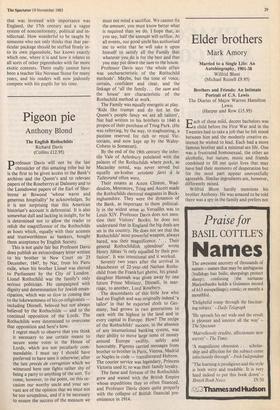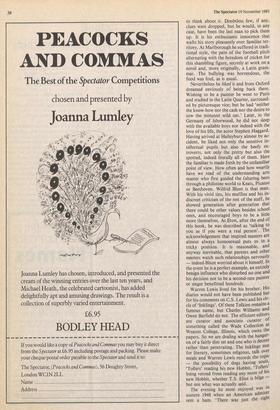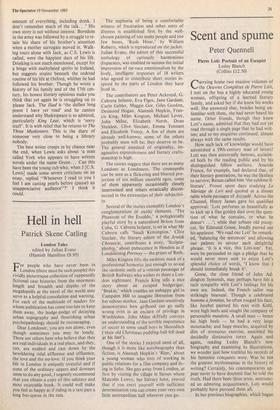Elder brothers
Mark Amory
Married to a Single Life: An Autobiography, 1901-38 Wilfrid Blunt (Michael Russell £9.95)
Brothers and Friends: An Intimate Portrait of C.S. Lewis The Diaries of Major Warren Hamilton Lewis (Harper and Row £15.95) Each of these mild, decent bachelors was a child before the First War and in the Twenties had to take a job that he felt stood between him and the modestly creative ex- istence he wished to lead. Each had a more famous brother and a minimal sex life. One was a frustrated homosexual, the other an alcoholic, but nature, music and friends combined to fill out quiet lives that may have had their moments of desperation but for the most part appear uneventfully agreeable. Similar ingredients are, however, differently mixed.
Wilfrid Blunt hardly mentions his brother Anthony. He was amazed to be told there was a spy in the family and prefers not to think about it. Doubtless few, if any, clues were dropped, but he would, in any case, have been the last man to pick them up. It is his enthusiastic innocence that wafts his story pleasantly over familiar ter- ritory. At Marlborough he suffered in tradi- tional style, the pain of the football pitch alternating with the boredom of cricket for this shambling figure, secretly at work on a novel and, more originally, a Latin gram- mar. The bullying was horrendous, the food was foul, as is usual.
Nevertheless he liked it and from Oxford dreamed enviously of being back there. Wishing to be a painter he went to Paris and studied in the Latin Quarter, surround- ed by picturesque vice; but he had 'neither the know-how nor the cash nor the desire to sow the minutest wild oat.' Later, in the Germany of Isherwood, he did not sleep with the available boys nor indeed with the love of his life, the actor Stephen Haggard. Having arrived at Haileybury almost by ac- cident, he liked not only the sensitive in- tellectual pupils but also the beefy ex- troverts, not only the pretty but also the spotted, indeed literally all of them. Here the familiar is made fresh by the unfamiliar point of view. How often and how wearily have we read of the understanding arts master who first guided the faltering hero through a philistine world to Keats, Picasso or Beethoven. Wilfrid Blunt is that man. With his vivid ties, his muffins and his in- discreet criticism of the rest of the staff, he showed generation after generation that there could be other values besides school ones, and encouraged boys to be a little more themselves. At Eton, after the end of this book, he was described as 'talking to you as if you were a real person'. The acknowledgement that inspired masters are almost always homosexual puts us in a tricky position. It is reasonable, and anyway inevitable, that parents and other masters watch such relationships nervously — indeed Blunt worried about it himself. In the event he is a perfect example, an entirely benign influence who disturbed no one and his decision not to be a second-rate painter or singer benefitted hundreds.
Warren Lewis lived for his brother. His diaries would not have been published but for his comments on C.S. Lewis and his cir- cle of 'Inklings'. Of these Tolkien remains a famous name, but Charles Williams and Owen Barfield do not. The efficient editors are curator and associate curator of something called the Wade Collection at Weaton College, Illinois, which owns the papers. So we are dealing with the hanger- on of a fairly dim set and one who is decent rather than penetrating. The Inklings met for literary, sometimes religious, talk over meals and Warren Lewis records the topic — the possibility of dogs having souls, 'Toilers' reading his new Hobbit, 'Toilers' being vetoed from reading any more of his new Hobbit, whether T.S. Eliot is bilge but not what was actually said.
The evening he most enjoyed was in austere 1948 when an American admirer sent a ham. 'There was just the right
amount of everything, including drink. I don't remember much of the talk ... ' His own story is not without interest. Boredom in the army was followed by a struggle to re- tain his share of his brother's attention when a mother surrogate moved in. Walk- ing tours alone with Jack, as C.S. Lewis is called, were the happiest days of his life. Drinking is not much mentioned, except for a binge with methylated spirits in Ireland, but suggests strains beneath the ordered routine of his life at Oxford, whither he had followed his brother. Though he wrote a history of his family and of the 17th cen- tury, his honest literary opinions make you think that yet again he is struggling on to please Jack. The Iliad is 'the dullest long poem I have yet read' and he cannot understand why Shakespeare is so admired, particularly King Lear, which is 'sorry stuff'. It is with relief that he returns to The Three Musketeers. This is the diary of someone very close to being a literary nobody.
The best writer creeps in by chance near the end, when Lewis asks about 'a man called York who appears to have written novels under the name Green ... Can this have been the young cub who, when J [C.S. Lewis] made some severe criticisms on an essay, replied "Whenever I read to you I feel I am casting pearls before (pause) an unappreciative audience"?' I think it could.




























































 Previous page
Previous page